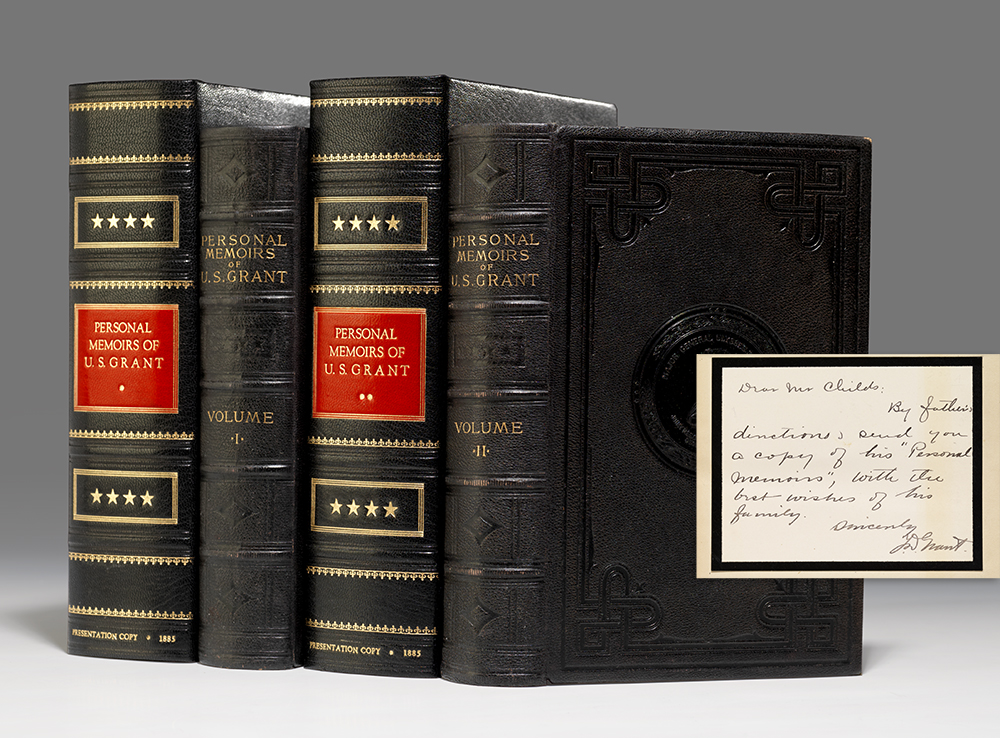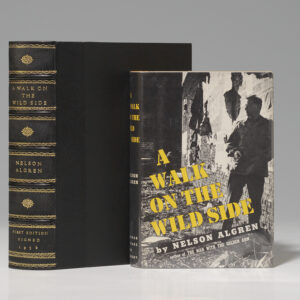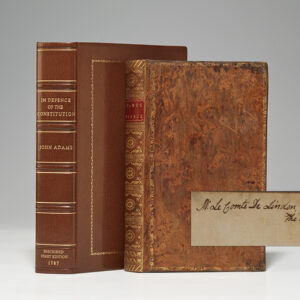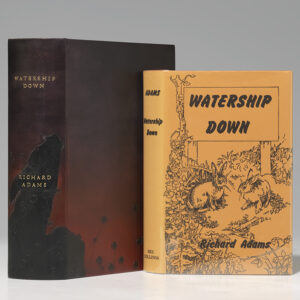Description
EXCEPTIONAL PRESENTATION COPY OF GRANT’S MEMOIRS,
IN PUBLISHER’S DELUXE FULL MOROCCO,INSCRIBED FROM GENERAL GRANT’S SON, COLONEL FRED D. GRANT, WRITTEN ON GRANT’S BEHALF TO CLOSE FRIEND AND FUTURE BIOGRAPHER GEORGE WILLIAM CHILDS,WITH A SIGNED AUTOGRAPH LETTER FROM COLONEL GRANT TO CHILDS
GRANT, Ulysses S. Personal Memoirs of U.S. Grant. New York: Charles L. Webster, 1885-86. Two volumes. Octavo, original deluxe full brown morocco gilt, raised bands, circular blind-stamped medallions on front and rear covers, marbled endpapers, all edges gilt. WITH: Single sheet of mourning stationery, measuring 9 by 7 inches, unfolded.
First edition, presentation copy, of the memoirs of one of the most recognized figures in American military history, illustrated with numerous steel engravings, facsimiles, and 43 maps, handsomely bound in scarce publisher’s deluxe full morocco, inscribed on a tipped-in mourning card by Grant’s son and his collaborator on the Memoirs, Colonel Fred D. Grant, to the future author of Recollections of General Grant: “Dear Mr Childs: By father’s directions I send you a copy of his ‘Personal memoirs’, with the best wishes of his family. Sincerely F.D. Grant.” Accompanied by a laid-in autograph signed letter from Colonel Grant thanking Mr. Childs for an oil painting of General Grant that he gave him after General Grant’s death.
After an ineffectual term as president, ruined by bankruptcy and dying of throat cancer, Grant agreed to publish his memoirs to provide a measure of economic security for his family. Mark Twain agreed to serve as the publisher. Struggling to dictate his notes to a stenographer, Grant finished his memoirs shortly before his death in the summer of 1885. “It seemed to Twain, sitting quietly near him in his bedroom at Sixtieth Street, that Grant had fully regained the stature of a hero” (Kaplan, 273). “Grant’s memoirs comprise one of the most valuable writings by a military commander in history” (Eicher 492). Accompanying this inscribed book, there is an autograph signed letter on black-bordered mourning stationery that reads: “New York. Feb 10th 1886. My Dear Mr Childs: The oil painting which you sent me has arrived. I wish I knew how to thank you for your kindness but can only express my appreciation in earnest and simple words, and shall ever present with pride your gift—my father’s portrait. My mother and wife join me in sending regards to Mrs Childs, Miss Lizzie and yourself. Believe me always with affection, Your friend. F.D. Grant.” “Called the most notable citizen of Philadelphia since Benjamin Franklin” (ANB), the recipient of this copy and the letter, George W. Childs, was a prominent Philadelphia publisher. He met Grant after Vickburg in 1863 and stayed his friend throughout his life, spending a period as his neighbor in Long Branch, New Jersey. The two maintained a steady correspondence and Grant came to share his most candid thoughts with Childs. When Grant moved to New York, Childs raised the money to pay for his house by subscription and the sale of securities. After Grant’s death, an event Childs found devastating, Childs memorialized him in Recollections of General Grant. The gift from Childs to Grant’s son reflects the strength of their friendship. Grant was a talented painter, specializing in watercolor. In fact, in the years before his death, he remarked to Childs that his fondness for the art went back to West Point. The gift of the painting, then, was undoubtedly a particularly poignant gesture. Childs recorded the writing of the Memoirs, as well as his receipt of this presentation copy and the letter that accompanied it (the letter included here) in the Recollections. He wrote: “The necessity of earning some money induced Grant to write the series of admirable articles for the Century Magazine. Upon their appearance I urged him, as did other friends of his, to expand them into a symmetrical and continuous narrative. Thus, had it not been for his financial reverses, it is doubtful whether American literature would have been enriched with his Personal Memoirs, a book of surpassing interest, which had enjoyed the largest circulation and yielded the largest copyright (over $415,000) of any work issued in modern times. Just before his death the General requested Mrs. Grant to send me his Memoirs, and as soon as the work was published Col. Grant sent me a handsomely bound copy with a very kind note.” Bookplates of businessman, philanthropist, and distinguished book collector W. Emmert Swigart, whose collection was notable for its emphasis on rare Pennsylvaniana. Ex-libris Juniata College, with bookplates and pencil notations.
An outstanding presentation copy with an extraordinary association in fine condition.



